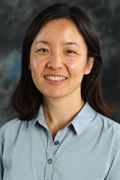
 A discovery by a UC Merced biophysicist has moved science a step closer toward fine-tuning cell functions and combating certain diseases.
A discovery by a UC Merced biophysicist has moved science a step closer toward fine-tuning cell functions and combating certain diseases.
Professor Jing Xu found that a cell’s nanomotor can be activated by a cellular cue often lacking in people suffering from neurodegeneration.
“What we see is quite dramatic,” Xu said. “There’s a significant increase in the population of active nanomotors.”
While many people may think of a cell being like a soup with genetic material, Xu said cells are very organized and more like a city. In this metaphor, nanomotors are cars that shuttle material between the cell and its membrane. The ability to tune motor function could be important for tuning cell function.
Xu looked at the nanomotor called kinesin-1. Kinesin-1 is the main workhorse for transporting materials out to the cell periphery. Defects with this nanomotor are linked to diseases including neurodegeneration. She then added casein kinase 2, which is an important cellular cue that is lacking in a number of neurodgenerations. A direct effect of casein kinase 2 on kinesin-1 motor function was not established until this study.
“We have identified one cellular cue that could act as a flip switch to turn on the motor protein,” she said. “We’re one step closer to playing traffic cop within a cell.”
Xu published her findings, “Casein kinase 2 reverses tail-independent inactivation of kinesin-1,” in Nature Communications last month. Nature Communications is an online-only, multidisciplinary journal focused on publishing high-quality research in all areas of the biological, physical and chemical sciences.
The findings identify a novel pathway for regulating nanomotor function, and suggest the possibility of using cellular cue to rescuing cell health.
One way of looking at a disease is that it’s a readout for the importance of certain cellular cues happening within a cell, Xu explained. By changing those cues, scientists can gain fundamental understanding on how diseases might occur, and how they might prevent or combat diseases.
Xu conducted her postdoctoral work at UC Irvine, before accepting a professorship at UC Merced. She arrived on campus last year. She’s begun a collaboration with Professor Ajay Gopinathan.
“UC Merced a very interdisciplinary school,” she said. “It’s an exciting and vibrant environment.”






